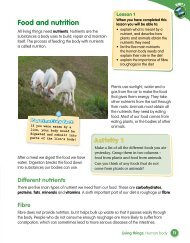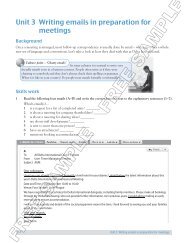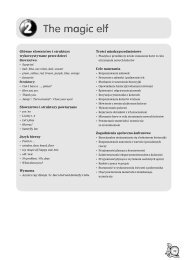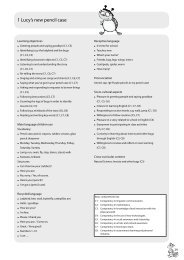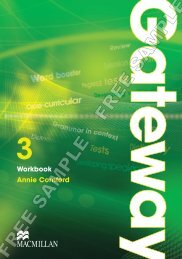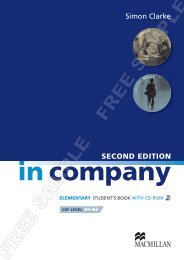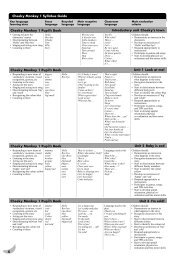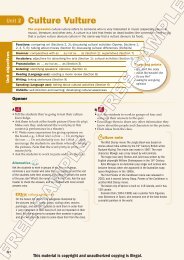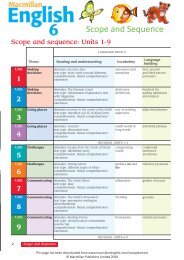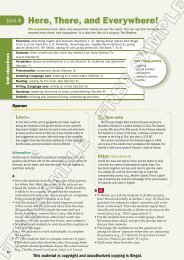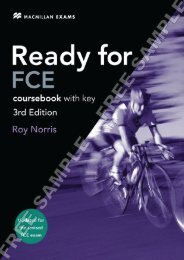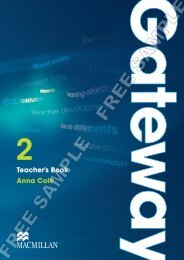You also want an ePaper? Increase the reach of your titles
YUMPU automatically turns print PDFs into web optimized ePapers that Google loves.
9NightGrammar Concessive clauses <strong>an</strong>d adverbials. Regrets <strong>an</strong>d past conditionalsVocabulary Times of day <strong>an</strong>d night. Expressions with nightUseful phrases Making <strong>an</strong>d responding to invitationsReading & Speaking1 Do the quiz <strong>an</strong>d check <strong>you</strong>r <strong>an</strong>swers on page 132.<strong>Are</strong> <strong>you</strong> a <strong>lark</strong> <strong>or</strong> <strong>an</strong> <strong>owl</strong>?1 The alarm clock goes off <strong>an</strong>d it’s time toget up. What do <strong>you</strong> do?a) Leap out of bed, ready to start the day.b) Press the snooze button <strong>an</strong>d doze f<strong>or</strong>just a few m<strong>or</strong>e minutes.c) Put a pillow over <strong>you</strong>r head <strong>an</strong>d goback to sleep.2 You have a day off tom<strong>or</strong>row <strong>an</strong>d nocommitments. What time do <strong>you</strong> pl<strong>an</strong> toget up?a) As early as possible, <strong>an</strong>d definitelybef<strong>or</strong>e 7.00.b) Probably sometime between 7.00<strong>an</strong>d 9.00.c) Why get up? You will sleep in as longas possible.5 When is <strong>you</strong>r n<strong>or</strong>mal bedtime?a) You’re usually tucked up <strong>an</strong>d fastasleep by 10.00 at the latest.b) You generally call it a night around11.00.c) You’re still up <strong>an</strong>d wide awake wellafter midnight.6 You’ve been invited to <strong>an</strong> all-night party.How do <strong>you</strong> respond?a) Sounds like <strong>you</strong>r idea of hell. You’dmuch rather have <strong>an</strong> early night <strong>an</strong>dget some beauty sleep.b) You go along <strong>an</strong>d stay until aboutone <strong>or</strong> two in the m<strong>or</strong>ning.c) You arrive at midnight <strong>an</strong>d are stillgoing strong as the sun comes up.3 You have to take <strong>an</strong> imp<strong>or</strong>t<strong>an</strong>t exam.When are <strong>you</strong>r mental powers at theirpeak?a) First thing in the m<strong>or</strong>ning.b) Anytime between mid-m<strong>or</strong>ning <strong>an</strong>dmid-afternoon.c) Last thing at night.4 A friend has invited <strong>you</strong> f<strong>or</strong> a w<strong>or</strong>k-outin the gym between 9.00 <strong>an</strong>d 10.00 p.m.How will <strong>you</strong> perf<strong>or</strong>m?a) Very po<strong>or</strong>ly. You will struggle to keep<strong>you</strong>r eyes open.b) Reasonably, as long as <strong>you</strong> c<strong>an</strong>go home <strong>an</strong>d wind down straightafterwards.c) Very well. And then <strong>you</strong>’ll invite <strong>you</strong>rfriend to go out on the town – thenight is still <strong>you</strong>ng!2 W<strong>or</strong>k with a partner. Discuss the me<strong>an</strong>ing of the highlighted w<strong>or</strong>ds <strong>an</strong>d phrases.Check in a dictionary if necessary.3 Compare <strong>you</strong>r <strong>an</strong>swers to the quiz in Exercise 1 in small groups. How does <strong>you</strong>renergy pattern compare <strong>an</strong>d fit in with those of <strong>you</strong>r friends <strong>or</strong> family members?88u n i t 9 Night
Vocabulary & Speaking1 W<strong>or</strong>k with a partner. Put these times of day in chronological <strong>or</strong>der.at dawn at dusk mid-afternoon mid-m<strong>or</strong>ningat midnight at sunrise at sunsetat midday2 When are these times? Discuss with <strong>you</strong>r partner. Which phrases are literary in style?at noon at twilight at daybreak at nightfall in the middle of the nightat the crack of dawn in the wee small hours first thing in the m<strong>or</strong>ninglast thing at night3 W<strong>or</strong>k with <strong>you</strong>r partner. Tell each other about the following:• <strong>you</strong>r favourite time of day• when <strong>you</strong> usually feel most <strong>an</strong>d least alert• what <strong>you</strong> generally do first thing in the m<strong>or</strong>ning <strong>an</strong>d last thing at night• the last time <strong>you</strong> got up at the crack of dawn• being woken up in the wee small hours / in the middle of the nightListening1 W<strong>or</strong>k in small groups. Discuss what the w<strong>or</strong>ds <strong>an</strong>d phrases in the box me<strong>an</strong>.body clock circadi<strong>an</strong> rhythms jet lag nocturnal <strong>an</strong>d diurnal creatures3.01 Listen to a radio show in which these w<strong>or</strong>ds are discussed, <strong>an</strong>d check if <strong>you</strong>are right.2 Read the sentences <strong>an</strong>d decide if they are true <strong>or</strong> false, acc<strong>or</strong>ding to the radioprogramme in Exercise 1.a) The n<strong>or</strong>mal circadi<strong>an</strong> rhythm is twenty-four hours in length.b) Nocturnal <strong>an</strong>imals do not live acc<strong>or</strong>ding to circadi<strong>an</strong> rhythms.c) A body clock is responsive to ch<strong>an</strong>ges in the environment.d) A body clock ch<strong>an</strong>ges our feelings of tiredness <strong>an</strong>d wakefulness.e) People are b<strong>or</strong>n with individual differences in their circadi<strong>an</strong> rhythms.f) Young children need m<strong>or</strong>e sleep th<strong>an</strong> adolescents.g) Older adults tend to get up later th<strong>an</strong> <strong>you</strong>nger adults.h) Jet lag is caused by lack of sleep.Listen again <strong>an</strong>d check <strong>you</strong>r <strong>an</strong>swers. Is there <strong>an</strong>ything that surprises <strong>you</strong> about whatthe scientist said?Nightu n i t 9 89
Reading1 Read the profiles from a sleep website. <strong>Are</strong> <strong>you</strong> like <strong>an</strong>y of these people?5101520253035A As a journalist I tend to w<strong>or</strong>klong hours <strong>an</strong>d so I rarely getm<strong>or</strong>e th<strong>an</strong> five <strong>or</strong> six hours sleepa night. I’m often up at thecrack of dawn to chase breakingnews, <strong>an</strong>d then w<strong>or</strong>king late intothe night keeping the blog upto date. I’m <strong>an</strong> energetic s<strong>or</strong>t ofperson most of the time <strong>an</strong>d late▲ Petenights don’t n<strong>or</strong>mally bother me.That said, I find the only way I c<strong>an</strong> function properlyis by taking regular power naps throughout the day.I usually drop off straight away – even so, I c<strong>an</strong>generally only get away with fifteen <strong>or</strong> twenty minutesat a time bef<strong>or</strong>e the phone rings <strong>an</strong>d I have to gooff on some assignment. Napping just takes the edgeoff the tiredness <strong>an</strong>d me<strong>an</strong>s I’m less groggy <strong>an</strong>d m<strong>or</strong>ealert, which is absolutely essential in my line of w<strong>or</strong>k.B I have real problems gettingto sleep at night. I do all thethings <strong>you</strong>’re supposed to do –wind down sl<strong>owl</strong>y, only go to bedwhen <strong>you</strong>’re tired, etc., etc. Buttry as I might to get off to sleep,I’ll invariably be tossing <strong>an</strong>dturning f<strong>or</strong> ages, then getting upto busy myself with variousch<strong>or</strong>es to try <strong>an</strong>d tire myself out. ▲ PennyAnd then, when I do eventually drop off, I tend towake up at the slightest sound <strong>an</strong>d lie awake f<strong>or</strong> hoursw<strong>or</strong>rying. I’ve tried all s<strong>or</strong>ts of remedies – prescriptiondrugs <strong>an</strong>d over-the-counter medication – but even thoughthe sleeping pills have some effect, I’m wary of becomingtoo reli<strong>an</strong>t on them as I don’t know what the long-termeffects are. Lack of sleep is also making me incredibly rundown. I’m really at my wits’ end – I just c<strong>an</strong>’t rememberwhen I last got a decent night’s sleep.40455055606570C I’m the <strong>an</strong>noying s<strong>or</strong>t ofperson who sleeps like a log. I’mn<strong>or</strong>mally so exhausted by theend of the day that I never have<strong>an</strong>y problems dropping off – infact, I generally go out like alight as soon as my head hits thepillow. I’ll sleep <strong>an</strong>ywhere – in ahotel, on a pl<strong>an</strong>e, on a friend’s▲ Amymattress, on a sofa, even – <strong>an</strong>d Ic<strong>an</strong> sleep through a thunderst<strong>or</strong>m, a wild party in thenext do<strong>or</strong> house, <strong>an</strong>ything. All the same, I need a goodeight hours’ sleep to recharge my batteries otherwiseI tend to spend the next day yawning <strong>an</strong>d I have evenbeen known to snap at people. N<strong>or</strong>mally I wake upfeeling refreshed <strong>an</strong>d revitalised.D Apparently I sn<strong>or</strong>e heavily(I’ve never actually heard myselfso I wouldn’t know). It drives mywife mad, particularly as she’sa light sleeper herself. It causesquite a bit of friction becausewhen I sn<strong>or</strong>e my wife prods <strong>or</strong>kicks me to wake me up <strong>an</strong>d thenI c<strong>an</strong>’t get off to sleep again. Orshe’ll move into the spare room ▲ Joe<strong>an</strong>d then she’ll complain the next day that she didn’tget a wink of sleep. I’ve tried sleeping on my side <strong>an</strong>dusing a raised pillow but in spite of my eff<strong>or</strong>ts, noneof it has done <strong>an</strong>y good. My wife keeps going on at meto lose weight – I’m not convinced it will make <strong>an</strong>ydifference, though. Much as I’d like to stop sn<strong>or</strong>ing, Itend to think if <strong>you</strong>’re a sn<strong>or</strong>er, that’s just the way <strong>you</strong>are <strong>an</strong>d <strong>you</strong>’re never going to ch<strong>an</strong>ge.Glossarya) _____ verb [I]: relax toconserve energyb) _____ verb phrase [I]: had asleepless nightc) _____ noun [C]: siestasd) _____ adj: wide awakee) _____ verb [I]: sleeps soundlyf) _____ noun [C]: person whowakes up regularlyg) _____ verb [I]: go to sleeph) _____ verb [I]: fall asleepimmediatelyi) _____ adj: drowsyj) _____ verb [I]: relax2 Read the profiles again. Which person <strong>or</strong> people (Pete, Penny, Amy <strong>or</strong> Joe) …a) c<strong>an</strong> only sleep f<strong>or</strong> sh<strong>or</strong>t stretches?b) mentions health problems as a result of sleep deprivation?c) c<strong>an</strong> get sh<strong>or</strong>t-tempered if they don’t get enough sleep?d) experiences relationship difficulties because of their sleep habits?e) needs to sleep to cope with w<strong>or</strong>k commitments?f) have/has experimented with different ways of solving their sleep problems?g) w<strong>an</strong>ts to ch<strong>an</strong>ge their sleeping habits?h) n<strong>or</strong>mally have/has no problems sleeping?3 Complete the glossary with the highlighted w<strong>or</strong>ds <strong>an</strong>d phrases from the profiles.4 W<strong>or</strong>k with a partner. What advice would <strong>you</strong> give these sleepers? Compare insmall groups.90u n i t 9 Night
GrammarConcessive clauses<strong>an</strong>d adverbialsEven though / Although Itried hard, I couldn’t getto sleep.Despite / In spite of myeff<strong>or</strong>ts, / Much as I’d liketo, I couldn’t get to sleep.I tried hard. Even so / Yet/ However / That said, Icouldn’t get to sleep.I tried hard. I couldn’t getto sleep, though. / All thesame, I couldn’t get tosleep.Try as I might, I couldn’tget to sleep.Str<strong>an</strong>ge as it may seem, Icouldn’t get to sleep.1 Read the sentences (a–d). <strong>Are</strong> they the same <strong>or</strong> different in me<strong>an</strong>ing?a) I slept f<strong>or</strong> ten hours, yet I still felt tired the next day.b) Although I slept f<strong>or</strong> ten hours, I still felt tired the next day.c) I slept f<strong>or</strong> ten hours. However, I still felt tired the next day.d) Despite sleeping f<strong>or</strong> ten hours, I still felt tired the next day.2 Underline eight concessive clauses <strong>or</strong> adverbials in the profiles on page 90 thatexpress a similar contrast. Which two are m<strong>or</strong>e f<strong>or</strong>mal in register?3 Rewrite the sentences using the w<strong>or</strong>ds in brackets.a) Despite going to bed early, I was still groggy the next day. (Even though)b) I don’t usually oversleep. All the same, I prefer to set the alarm clock. (though)c) The bed was very uncomf<strong>or</strong>table. Nevertheless, I slept like a log. (In spite of)d) I’d like to get by on six hours a night but I c<strong>an</strong>’t m<strong>an</strong>age on less th<strong>an</strong> seven.(Much as)e) Although I’m n<strong>or</strong>mally <strong>an</strong> early riser, I like to have a lie-in on Sundays. (That said)4 Re<strong>or</strong>der the underlined w<strong>or</strong>ds to make concessive clauses.a) was / as / exhausted / I, I couldn’t get off to sleep.b) may / str<strong>an</strong>ge / seem / it / as, I c<strong>an</strong>’t get by on less th<strong>an</strong> ten hours sleep a night.c) it / be / as / may / hard, we need to get up at the crack of dawn tom<strong>or</strong>row.d) might / try / I / as, I couldn’t wake him up.5 Read the posting to a website. What is the person’s problem?Does <strong>an</strong>yone have <strong>an</strong>y suggestions asto what to do about persistently noisyneighbours? The people in the flat abovemine have their music on at full blasttill the small hours most nights <strong>an</strong>d it’sdriving me mad. (1) _____ my politerequests to them to turn the music down,so far they haven’t taken a blind bit ofnotice. I’ve tried using ear plugs, I’vetried b<strong>an</strong>ging on the wall – all to noavail, (2) _____ . My boyfriend thinksI’m being unreasonable. (3) _____ , Ido think everyone is entitled to a goodnight’s sleep! Patient (4) _____ I amn<strong>or</strong>mally, I’m at my wits’ end – c<strong>an</strong><strong>an</strong>yone help?Complete the posting with appropriate w<strong>or</strong>ds <strong>or</strong> phrases.Have <strong>you</strong> ever been in a similar situation? If so, what did <strong>you</strong> do? What advice would<strong>you</strong> give to the writer?6 W<strong>or</strong>k with a partner. Write a similar posting f<strong>or</strong> one of these problems. Use at leastthree different concessive clauses.• I keep oversleeping in the m<strong>or</strong>ning.• I’m always drowsy in the afternoon.• I always wake up at five in the m<strong>or</strong>ning <strong>an</strong>d c<strong>an</strong>’t get back to sleep.Show <strong>you</strong>r posting to <strong>an</strong>other pair. What advice do they have?7 Grammar Extra 9, Part 1 page 142. Read the expl<strong>an</strong>ations <strong>an</strong>d do Exercise 1.Nightu n i t 9 91
Listening & Pronunciation▲ James1 3.02–3.04 Listen to three friends, James, Rosie <strong>an</strong>d Phillip, describing experiencesof staying up all night. F<strong>or</strong> each person, make notes on the following questions.a) Where did the experience take place?b) What did the person do during the night?c) Did they enjoy the experience? Why? / Why not?Which of the nights would <strong>you</strong> most <strong>an</strong>d least like to have shared? Why? Discusswith a partner.▲ Rosie▲ Phillip2 3.05 Listen to some extracts from the experiences in Exercise 1 <strong>an</strong>d complete thesentences with adverbs. Sometimes there is m<strong>or</strong>e th<strong>an</strong> one adverb in a sentence.a) I had this one unf<strong>or</strong>gettable night up in the mountains – in Nepal it was _____ .b) The hours just passed, <strong>you</strong> know, just conversing about the sky _____ .c) It’s _____ m<strong>an</strong>ic. The whole experience is crazy.d) So there’s _____ no point in going to bed because everyone’s up <strong>an</strong>yway.e) It was _____ w<strong>or</strong>th it.f) _____ there were about, I think about twenty people in front of us.g) We were going to go <strong>an</strong>d see this show – _____ our hero.h) We slept out the whole night <strong>an</strong>d spent the whole night there <strong>an</strong>d didn’t even get tosee the show, _____ .i) We were _____ upset.3 Which adverbs in the sentences (a–i) in Exercise 2 …1 add emphasis?2 express regret?3 suggest that something is obvious?4 express surprise?5 emphasise the main point, not specific details?6 stress exact details ?7 add <strong>an</strong> afterthought?4 How m<strong>an</strong>y syllables are there in each of the adverbs in the box? Practise saying eachof the w<strong>or</strong>ds.actually basically especially eventually generally ironically literallyparticularly practically usually3.06 Listen <strong>an</strong>d check.5 Write true sentences about <strong>you</strong>r experience of parties, concerts <strong>or</strong> festivals using someof the adverbs in Exercise 4. Practise reading them aloud to <strong>you</strong>r partner.Speaking: <strong>an</strong>ecdoteYou are going to tell <strong>you</strong>r partner about a time <strong>you</strong> stayed up late <strong>or</strong> all night, f<strong>or</strong>example: w<strong>or</strong>king a night shift, travelling overnight, attending a party <strong>or</strong> festival,writing <strong>an</strong> essay <strong>or</strong> revising f<strong>or</strong> <strong>an</strong> exam.• Ask <strong>you</strong>rself the questions below.• Think about what to say <strong>an</strong>d how to say it.• Tell <strong>you</strong>r partner about the night.a) Where <strong>an</strong>d when did the experiencetake place?b) Why did <strong>you</strong> stay up all night?c) Who were <strong>you</strong> with?d) What happened during the night?e) What did <strong>you</strong> see, hear <strong>or</strong> do?f) What feelings did <strong>you</strong> experience?g) How did <strong>you</strong> feel at the end of the night?h) Was it a w<strong>or</strong>thwhile experience?92u n i t 9 Night
Speaking1 Match the two halves of the proverbs about night.a) Wait f<strong>or</strong> the nightb) If <strong>you</strong> befriend a mosquito,c) No matter how long the night,d) Red sky at night, shepherds’ delight;e) If in doubt about what is right,f) He who does not lose his way by night,g) At night all catsh) The road to Heaven is well signposted,i) The night hides a w<strong>or</strong>ld,1 will not lose his way by day. (Nigeri<strong>an</strong>)2 but reveals a universe. (Ir<strong>an</strong>i<strong>an</strong>)3 are grey. (Dutch)4 but it is badly lit at night. (Irish)5 bef<strong>or</strong>e saying that the day has been beautiful. (Bengali)6 it will still attack <strong>you</strong> at night. (Afric<strong>an</strong>)7 red sky in the m<strong>or</strong>ning, shepherds’ warning. (English)8 consult <strong>you</strong>r pillow overnight. (Mexic<strong>an</strong>)9 the dawn will break. (Afric<strong>an</strong>)2 W<strong>or</strong>k with a partner. Discuss these questions about the proverbs in Exercise 1.a) <strong>Are</strong> there <strong>an</strong>y proverbs <strong>you</strong> don’t underst<strong>an</strong>d?b) Which do <strong>you</strong> like best, <strong>an</strong>d why?c) Do <strong>you</strong> have similar sayings in <strong>you</strong>r own country?3 W<strong>or</strong>k with <strong>you</strong>r partner. Complete the sentences to create proverbs of <strong>you</strong>r own.a) No matter how long the journey, …b) However good the teacher, …c) Wherever <strong>you</strong> live, …d) Even if …Compare with <strong>an</strong>other pair. Which proverbs do <strong>you</strong> like best?Vocabulary1 W<strong>or</strong>k with <strong>you</strong>r partner. Complete the sentences with w<strong>or</strong>ds from the box.nightcap hen long overnight stag towna) I’m absolutely exhausted. I w<strong>or</strong>ked all night _____ yesterday.b) ‘Would <strong>you</strong> like a _____ bef<strong>or</strong>e <strong>you</strong> go home?’ ‘I’d better not, I’m driving.’c) We had a night on the _____ last night. We went clubbing <strong>an</strong>d didn’t get back till thesmall hours.d) I’m going to get the _____ sleeper to Venice so I’ll arrive first thing in the m<strong>or</strong>ning.e) Magda <strong>an</strong>d Peter are getting married next week. Magda’s having her _____ night atLuigi’s Night Club <strong>an</strong>d Peter is going with some friends to Dublin at the weekendf<strong>or</strong> his _____ night.Discuss the me<strong>an</strong>ing of the w<strong>or</strong>ds <strong>an</strong>d expressions in italics with <strong>you</strong>r partner.2 W<strong>or</strong>k with <strong>you</strong>r partner. Choose one of these questions to discuss.a) Imagine <strong>you</strong>’ve just passed <strong>you</strong>r final exams. Where would <strong>you</strong> go to have a nighton the town? Who would <strong>you</strong> invite? What would <strong>you</strong> do?b) Imagine <strong>you</strong>r best friend is getting married <strong>an</strong>d has asked <strong>you</strong> to <strong>or</strong>g<strong>an</strong>ise his/herstag/hen night. What would <strong>you</strong> do?Nightu n i t 9 93
The aur<strong>or</strong>a b<strong>or</strong>ealis is a fickle phenomenon. A weekc<strong>an</strong> pass without a flicker … then b<strong>an</strong>g! The N<strong>or</strong>thernLights come on like a celestial lava lamp. In the farn<strong>or</strong>th of Sweden, Nigel Tisdall is rewarded f<strong>or</strong> hispatience.1) _____ In days of y<strong>or</strong>e, when the fur-wrapped peoples ofthe Arctic looked up at the celestial disco we now know asthe aur<strong>or</strong>a b<strong>or</strong>ealis, they would see warri<strong>or</strong>s with burningsw<strong>or</strong>ds, shimmering shoals of fish <strong>an</strong>d the spirits of thedead playing football with a walrus skull. Our modern eyesc<strong>an</strong>’t help but see m<strong>or</strong>e contemp<strong>or</strong>ary likenesses, yet thissense of wonder binds us through time like a heartbeat.The fleeting light show is so magnificent that my mindgoes into overdrive as I try to burn the fast-ch<strong>an</strong>gingshapes into my mem<strong>or</strong>y b<strong>an</strong>k f<strong>or</strong> ever. At the same time, abaser feeling is rising. Yes! I’ve done one of those thous<strong>an</strong>dthings we’re all supposed to do bef<strong>or</strong>e we die, as if lifewere just a shopping list of sensational experiences to beticked off.2) _____ Yet true travellers would have it no other way.Like going on safari, whale watching <strong>or</strong> fly-fishing, seeingthe aur<strong>or</strong>a is a beguiling marriage of sheer luck <strong>an</strong>d theeff<strong>or</strong>t <strong>you</strong> make to be in the best place at the optimumtime. The <strong>an</strong>noying thing is that the aur<strong>or</strong>a is above usall the time, day in, day out – <strong>an</strong>d in duplicate. Imaginea beautifully-coloured halo, ebbing <strong>an</strong>d flowing in acircle above Alaska, n<strong>or</strong>thern C<strong>an</strong>ada, Icel<strong>an</strong>d, ArcticSc<strong>an</strong>dinavia <strong>an</strong>d the n<strong>or</strong>th coast of Siberia – with a mirr<strong>or</strong>image, the aur<strong>or</strong>a australis, looping over Antarctica.3) _____ This me<strong>an</strong>s travellers have to be especially smartin their search f<strong>or</strong> the clear, dark skies that are idealconditions f<strong>or</strong> a sensational sighting. Travelling close tothe Arctic Circle in the winter months holds the key,preferably on dates when there isn’t a full moon (a rivallight source) <strong>an</strong>d to locations beneath the aur<strong>or</strong>al oval thatare not only far from light pollution but also blessed withgood weather. You c<strong>an</strong> try to narrow the odds by lookingf<strong>or</strong> a ‘sweet spot’, which is why I am tramping the pristinesnows of Abisko, 60 miles west of Kiruna in the far n<strong>or</strong>thof Sweden. Abisko is brazenly claimed to be ‘the bestplace in the w<strong>or</strong>ld’ to see the aur<strong>or</strong>a b<strong>or</strong>ealis. All this israther galling as I sit in the Abisko Turiststation, nursinga frighteningly-priced beer <strong>an</strong>d thinking, ‘Okay, night sky… bring it on.’ Unf<strong>or</strong>tunately there is a mighty blizzardoutside. Yes, I do appreciate that this is the Arctic in winter– <strong>an</strong>d, being British, I know all about mete<strong>or</strong>ologicaldisappointment. We have all lit the barbecue just secondsbef<strong>or</strong>e the first raindrops fall …4) _____ Our arrival is timed f<strong>or</strong> 10.30p.m.: ‘magneticmidnight’, when the local aur<strong>or</strong>al activity should be at itsmost intense. Except it isn’t. Everyone lolls around in thecafé as if some divine flight has been delayed – but as thesmall print says, sightings are not guar<strong>an</strong>teed. Our guidehas a rule of thumb that if <strong>you</strong> stay at Abisko f<strong>or</strong> threenights, <strong>you</strong> are certain to see the aur<strong>or</strong>a (though he isoffering no refunds) – but of course, silly time-po<strong>or</strong> me istrying to do it in two.5) _____ It is far better to head n<strong>or</strong>th f<strong>or</strong> <strong>an</strong> Arctic holidaypacked full of adventures; then, should the N<strong>or</strong>thern lightbulbs also flash, well, that’s a bonus. And so it is that, justwhen I am not desperately seeking them, the N<strong>or</strong>thernLights come to me. My sighting happens while we are outon a night snowmobile safari, <strong>an</strong>d everyone skidoos to ahalt as the heavens erupt in what looks like the prelude toa visitation by UFOs. Marching armies in shining armour,apocalyptic bonfires, bolts of silk in rainbow hues … It isa brief encounter none of us will f<strong>or</strong>get, sparking feelingsof humility <strong>an</strong>d euph<strong>or</strong>ia. Yes, I know it is –5°C <strong>an</strong>d wehave to spend the night kipping on a block of ice butreally, I don’t care, because – hallelujah! – I have seen theN<strong>or</strong>thern Lights. That leaves only <strong>an</strong>other 999 thingsto do.Glossarya) ______ verb [I]: ch<strong>an</strong>ging often<strong>an</strong>d unexpectedlyb) ______ adj: gently shining <strong>an</strong>dshakingc) ______ adj: very briefd) ______ adj: heavenlye) ______ adj: <strong>an</strong>noying <strong>an</strong>d unfairf) ______ adj: wild <strong>an</strong>d terrible,like the end of the w<strong>or</strong>ldg) ______ noun [C]: a simple,practical ruleh) ______ adj: perfectly cle<strong>an</strong>i) ______ adj: attractive <strong>an</strong>dinteresting94u n i t 9 Night
Reading1 Read the traveller’s account of a trip to Sweden to see the N<strong>or</strong>thern Lights on page 94.Was the trip w<strong>or</strong>thwhile? Why? / Why not?2 Match the first lines (a–e) to the paragraphs (1–5) in the account.a) The strength of aur<strong>or</strong>al activity runs in 11-year cycles, <strong>an</strong>d it is just our luck that weare currently in a trough.b) It is, of course, courting disaster to set so much st<strong>or</strong>e by a natural phenomenon thatis not<strong>or</strong>iously elusive.c) There is a lesson here f<strong>or</strong> all aur<strong>or</strong>a chasers, <strong>an</strong>d that is not to get fixated with thissingle goal.d) Heavens above! The night sky is singing with colour.e) The next night I take the chairlift up to the Aur<strong>or</strong>a Sky Station.3 Find evidence from the account to supp<strong>or</strong>t these statements about the N<strong>or</strong>thern Lights.a) People’s interpretation of them has ch<strong>an</strong>ged over the years.b) There are two kinds of aur<strong>or</strong>a in the w<strong>or</strong>ld.c) It is not easy to see the N<strong>or</strong>thern Lights.d) Precise conditions are needed to be able to see them.e) The experience of seeing them is awe-inspiring.4 Complete the glossary with w<strong>or</strong>ds <strong>an</strong>d phrases from the account.5 Would <strong>you</strong> like to go on a holiday like this? Why? / Why not? What three experienceswould <strong>you</strong> like to have bef<strong>or</strong>e <strong>you</strong> die?Listening & GrammarRegrets <strong>an</strong>d pastconditionalsI wish I’d / If only I couldhave gone f<strong>or</strong> longer.I‘d have liked to go f<strong>or</strong> longer.I regret (not) going in the lowseason.If I had stayed f<strong>or</strong> longer,I‘d / could / might have seenthe sunrise.If it hadn’t been f<strong>or</strong> the rain,I’d have seen the sunrise.▲ Kier<strong>an</strong>1 3.07 Listen to Kier<strong>an</strong> talking about a trip to Machu Picchu. What was disappointing<strong>an</strong>d rewarding about the experience?2 3.08 Listen again to extracts from the rec<strong>or</strong>ding. Complete Kier<strong>an</strong>’s sentences.a) I _____ there in the low season …b) I think if _____ those altitude pills, I _____ okay.c) It’s a pity _____ f<strong>or</strong> longer.3 Read the sentences about Kier<strong>an</strong>’s regrets <strong>an</strong>d underline the c<strong>or</strong>rect alternatives.a) I wish I ’d gone / went / could have gone in the low season.b) I regret taking / having taken / not taking / not having taken altitude pills.c) If <strong>you</strong> came / ’d come / would have come with me, it ’d been / ’d have been / mighthave been m<strong>or</strong>e fun.d) If I ’d been / Had I been / If I was feeling well, I ’d / could / should have got up tosee the sunrise.e) But f<strong>or</strong> / Except f<strong>or</strong> / If it hadn’t been f<strong>or</strong> the rain I ’d have had / ’d / ’d have somephotos now.4 Rewrite the sentences, using the w<strong>or</strong>ds in brackets.a) I’m s<strong>or</strong>ry I didn’t go in the low season. (I wish)b) What a pity I wasn’t able to go with <strong>you</strong>. (I regret)c) I didn’t see the sunrise, which was a shame. (I would have liked)d) It was packed with tourists, so I didn’t get a feel f<strong>or</strong> the atmosphere. (If)e) If only I had taken some good photos! (It’s a pity)f) My altitude sickness me<strong>an</strong>t I couldn’t get up to see the sunrise. (But f<strong>or</strong>)g) It was a great experience, though – that’s why I w<strong>an</strong>t to go again. (If)5 Tell <strong>you</strong>r partner about a holiday <strong>you</strong> have been on. Use the l<strong>an</strong>guage in Exercises 3<strong>an</strong>d 4 to express things <strong>you</strong> regret, <strong>or</strong> things <strong>you</strong> were glad about.6 Grammar Extra 9, Part 2 page 142. Read the expl<strong>an</strong>ations <strong>an</strong>d do the Exercise 2.Nightu n i t 9 95
Useful phrases1 Read the exch<strong>an</strong>ges (1–4). What is the problem with B’s responses?1 A: What are <strong>you</strong> up to tom<strong>or</strong>row night?B: Nothing.2 A: <strong>Are</strong> <strong>you</strong> doing <strong>an</strong>ything tonight?B: No.3 A: Do <strong>you</strong> f<strong>an</strong>cy coming to a jazz concert tonight?B: I don’t like jazz.4 A: I was wondering if <strong>you</strong>’d like to come round f<strong>or</strong> a bite to eat this evening?B: Yes.2 How could <strong>you</strong> improve the exch<strong>an</strong>ges in Exercise 1 using the useful phrases (a–f)?a) To be honest, I’m not very keen on …b) No, what did <strong>you</strong> have in mind?c) That sounds great!d) I’d love to!e) Nothing special – why do <strong>you</strong> ask?f) That’s really kind of <strong>you</strong>, but …3 3.09 Listen to the exch<strong>an</strong>ges <strong>an</strong>d compare <strong>you</strong>r <strong>an</strong>swers with the rec<strong>or</strong>ding. Thenpractise the exch<strong>an</strong>ges with a partner.4 Look at the responses to the invitation. Which one is m<strong>or</strong>e f<strong>or</strong>mal th<strong>an</strong> the others?I’m having some friends over f<strong>or</strong> a barbecue on Sunday afternoon. You’re very welcome to join us.a) Th<strong>an</strong>ks very much f<strong>or</strong> asking, but I’m afraid I c<strong>an</strong>’t make Sunday afternoon.b) I’d really like to, but I’ve got something on then. I’m going to my parents’.c) I really appreciate the invitation, but unf<strong>or</strong>tunately I have a pri<strong>or</strong> engagement.d) I’m tied up on Sunday, I’m afraid. Th<strong>an</strong>ks <strong>an</strong>yway.5 Complete the conversations (1–3) with useful phrases.1 A: Hi, what _____ tonight?B: Actually, I’m up to _____ with w<strong>or</strong>k tonight.A: Oh, that’s _____ . I just thought we might go out f<strong>or</strong> a drink to celebrate the end ofterm.B: That _____ brilli<strong>an</strong>t, but I’m afraid I’ve got to h<strong>an</strong>d in a rep<strong>or</strong>t first thing tom<strong>or</strong>rowm<strong>or</strong>ning. Th<strong>an</strong>ks _____ .A: Never mind. Some _____ perhaps.2 A: How about _____ sometime over the weekend to discuss the holiday?B: _____ good. My place <strong>or</strong> <strong>you</strong>rs?A: You could come round here if <strong>you</strong> like. Would eleven on Sunday be _____ ?B: _____ , could we make it a bit later? Say, twelve-ish?A: That’d be _____ . See <strong>you</strong> around twelve on Sunday then.B: Cool. See <strong>you</strong> _____ .3 A: We’re having a party on Friday night, from about eight onwards. Do <strong>you</strong> _____ ?B: That’d be fab. Th<strong>an</strong>ks! _____ bring <strong>an</strong>ything?A: No, that’s fine. Just <strong>you</strong>rself! And _____ a friend if <strong>you</strong> like.B: Great, see <strong>you</strong> on Friday then.A: Yeah, look _____ it.3.10 Listen <strong>an</strong>d compare <strong>you</strong>r <strong>an</strong>swers with the rec<strong>or</strong>dings. Then practise readingthe conversations with <strong>you</strong>r partner.6 W<strong>or</strong>k with <strong>you</strong>r partner. Invite each other to do something tom<strong>or</strong>row, on Fridayevening <strong>an</strong>d at the weekend. Accept <strong>or</strong> give <strong>an</strong> excuse if <strong>you</strong> turn down theinvitation. If <strong>you</strong> accept, make clear arr<strong>an</strong>gements to meet.96u n i t 9 Night
Vocabulary ExtraPhrasal verbs1 Underline the verb <strong>an</strong>d circle the particle in the phrasal verbs in thesentences (a–e). What is the general me<strong>an</strong>ing of up <strong>an</strong>d off in thephrasal verbs?a) You’re still up <strong>an</strong>d wide awake well after midnight.b) What time do <strong>you</strong> pl<strong>an</strong> to get up?c) C<strong>an</strong> <strong>you</strong> remember a time when <strong>you</strong> stayed up all night?d) I am up <strong>an</strong>d down all night until I eventually feel tired enough todrop off.e) I generally start nodding off at about nine o’clock.2 W<strong>or</strong>k with a partner. Match the me<strong>an</strong>ing of the phrasal verbs with up (a–e)in Exercise 1 to the dictionary extracts (1–5).a) Do <strong>you</strong> always remember to do up <strong>you</strong>r seatbelt bef<strong>or</strong>e <strong>you</strong> travel by car?b) Do <strong>you</strong> tear up letters when <strong>you</strong>’ve finished reading them?c) Do <strong>you</strong> usually tidy up <strong>you</strong>r bedroom bef<strong>or</strong>e <strong>you</strong> leave the house?d) When did <strong>you</strong> last go up to someone in the street to ask a question?e) Do people ever ask <strong>you</strong> to speak up because they c<strong>an</strong>’t hear <strong>you</strong>?Ask <strong>you</strong>r partner the questions.3 Find three m<strong>or</strong>e phrasal verbs in the dictionary extracts on the right <strong>an</strong>dwrite sentences that are true f<strong>or</strong> <strong>you</strong>. Compare <strong>you</strong>r ideas with <strong>you</strong>r partner.4 Choose the c<strong>or</strong>rect particle from the box f<strong>or</strong> each pair of sentences.down in off on outa) 1 If I run _____ of money, I usually ask a friend to lend me some.2 A lot of species of pl<strong>an</strong>ts <strong>an</strong>d <strong>an</strong>imals are dying _____ in my countrybecause of pollution.b) 1 I tend to keep _____ w<strong>or</strong>king even if I feel tired.2 I’d like to stay _____ at school next year to study m<strong>or</strong>e English.c) 1 Reading a bad review tends to put me _____ films.2 I used to like chocolate but now I’ve gone _____ it.d) 1 I generally note _____ English w<strong>or</strong>ds when I come across them.2 If I don’t write things _____ on a list I tend to f<strong>or</strong>get to do them.e) 1 I like to lie _____ on Sunday m<strong>or</strong>nings.2 Sometimes I sleep _____ till midday if I’ve had a late night the daybef<strong>or</strong>e.<strong>Are</strong> <strong>an</strong>y of the sentences true f<strong>or</strong> <strong>you</strong>? Discuss with <strong>you</strong>r partner.5 W<strong>or</strong>k with <strong>you</strong>r partner. Complete the sentences with the prepositions inthe box.up (x 2) down on outa) C<strong>an</strong> <strong>you</strong> cut _____ the cake so that there’s a piece f<strong>or</strong> everyone?b) I’m afraid all the tickets f<strong>or</strong> tonight’s concert have sold _____ .c) C<strong>an</strong> <strong>you</strong> put my name _____ f<strong>or</strong> the trip to the museum on Sunday?d) At the end of the boat trip, we tied _____ the boat <strong>an</strong>d got out.e) If <strong>you</strong> w<strong>an</strong>t to know what happens in the rest of the st<strong>or</strong>y, <strong>you</strong>’ll haveto read _____ to the end of the book.6 Check <strong>you</strong>r own dictionary. Look up me<strong>an</strong>ings of one of the particles in, on,off, out <strong>or</strong> down. Choose three uses with different verbs to learn.Nightu n i t 9 97



